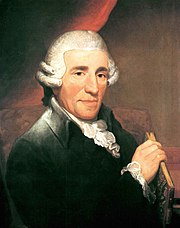L'anima del filosofo
| L'anima del filosofo | |
|---|---|
| Opera by Joseph Haydn | |
 Portrait of Haydn by Thomas Hardy, 1791 | |
| Translation | The Soul of the Philosopher |
| Other title | Orfeo ed Euridice |
| Librettist | Carlo Francesco Badini |
| Language | Italian |
| Based on | Myth of Orpheus |
| Premiere | 9 June 1951 Teatro della Pergola, Florence |
L'anima del filosofo, ossia Orfeo ed Euridice (The Soul of the Philosopher, or Orpheus and Euridice),
Background
After his patron Prince
The score was nearly completed but was not published in its complete form before the 20th century. It was partially published by Breitkopf & Härtel in c. 1807.[3]
Various manuscripts were scattered in several European libraries.[4] H. C. Robbins Landon did much to assemble the available scores.
Performance history
L'anima del filosofo remained unperformed until 9 June 1951, when it appeared at the Teatro della Pergola, Florence, with a cast including Maria Callas and Boris Christoff, under the conductor Erich Kleiber.
The UK premiere was in 1955, a concert performance at the
Roles
| Role | Voice type | Premiere cast, 9 June 1951[6] Conductor: Erich Kleiber |
|---|---|---|
| Orfeo | tenor | Thyge Thygesen |
| Euridice | soprano | Maria Callas |
| Plutone | bass | Mario Frosini |
| Creonte | bass | Boris Christoff |
| Baccante | soprano | Liliana Poli |
| Genio | soprano | Julanna Farkas |
| First courtier | baritone | Camillo Righini |
| Second courtier/Warrior | tenor | Gino Orlandini |
| Third courtier | baritone | Edio Peruzzi |
| Fourth courtier | tenor | Lido Pettini |
Instrumentation
The opera is scored for a 12-instrument classical chamber orchestra:
- Two flutes
- Two oboes
- Two clarinets
- Two cors anglais
- Two bassoons
- Two horns
- Two trumpets
- Two trombones
- timpani
- harp
- Strings
- Continuo
Music
Haydn borrowed previously composed music as the basis for select portions of the opera. One notable example is Genio's "C Major" aria which was a reformed version of Flaminia's aria "Ragion nell'alma siede" from the 1773 opera, Philemon und Baucis.[7]
Recordings
- 1951 – Herbert Handt (Orfeo), Judith Hellwig (Euridice), Alfred Poell (Creonte), Hedda Heusser (Genio), Walter Berry (Pluto), Richard Walleigh (First courtier) – Wiener Staatsopernchor und Orchester, Hans Swarowsky – 3 LPs The Haydn Society
- 1967 – Scottish National Orchestra, Richard Bonynge– 2 CDs Opera d'Oro
- 1994 – Robert Swensen (Orfeo), Münchner Rundfunkorchester, Leopold Hager – 2 CDs Orfeo
- 1997 – Uwe Heilmann (Orfeo), Cecilia Bartoli (Euridice), Ildebrando d'Arcangelo (Creonte), Cecilia Bartoli (Genio), Andrea Silvestrelli (Pluto), Angela Kazimierczuk (Baccante) – Academy of Ancient Music, Christopher Hogwood – 2 CDs L'Oiseau-Lyre
References
- JSTOR 765813.
- JSTOR 40831551.
- ^ Joseph Haydn : Orfeo ed Euridice (L'anima del filosofo) 1951 edition, Haydn Society Boston
- ^ The opera whose time hadn't come, Haydn Seek
- ^ Millington, Barry (27 May 2012). "Derek Hammond-Stroud obituary". The Guardian. Retrieved 11 July 2013.
- ^ Casaglia, Gherardo (2005). "L´anima del filosofo ossia Orfeo e Euridice, 9 June 1951". L'Almanacco di Gherardo Casaglia (in Italian).
- JSTOR 2738171.
External links
- L'anima del filosofo: Scores at the International Music Score Library Project
- Loder, Sue (16 August 2007). "Haydn's L'anima del filosofo (Orfeo ed Eurydice) – A rare performance at Glimmerglass this summer, as part of their 'Orpheus' 2007 Festival season". Opera Today. Retrieved 9 October 2020.
- McCallum, Peter (4 December 2010). "L'anima del filosofo: Orpheus and Eurydice". The Sydney Morning Herald. Retrieved 11 July 2013.
